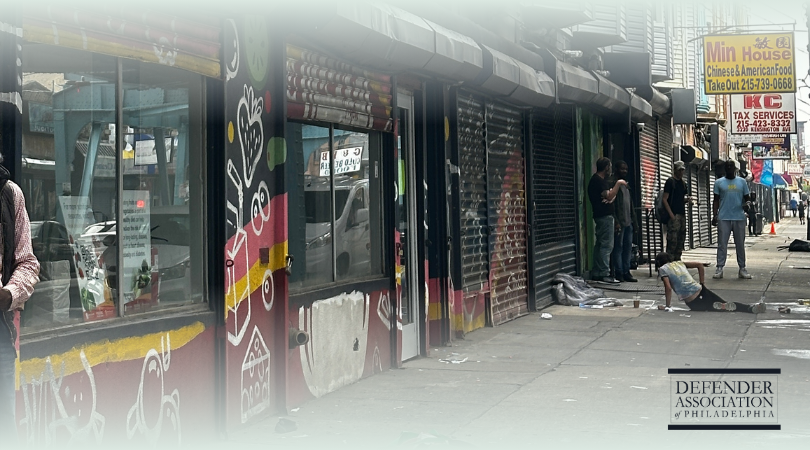The Defender Association fully realizes that immediate action is needed to address the conditions in Kensington. But the City’s May 8 “sweep” of homeless people signals a return to draconian and ineffective crime and drug policies. We are also troubled by the lack of communication we have received from the city in advance of these actions. This information vacuum is particularly concerning as it potentially compromises our ability to serve our clients.
Click on any of the menu items below to learn more about the Defender's perspectives on what's really needed in Kensington:
WHAT WE KNOW ABOUT OUR KENSINGTON CLIENTS
Because we are responsible for legal representation and mitigation on behalf of these community members, we have been able to gain unique insight into their needs. For example, we know that:
Approximately 18% of our clients each year call Kensington Home.
Between 2017 and 2022, our office represented 11,803 adults who lived in the neighborhood.
The majority–53%—of our Kensington clients are White-Hispanic; 36% are Black Non-Hispanic; and only 11% of our clients in the district were White non-Hispanic.
They are more likely to have been involved in the child welfare system and more likely to be arrested multiple times in the five-year period than peers who reside in other districts;
18% of District 7 cases involve an arrestee with a child welfare history; and
Slightly over half of all arrests made in District 7 are people who have been arrested at least once before in the last five years.
Many obstacles to improving safety and quality of life are largely systemic. Our clients who reside in and near Kensington have experienced years of disinvestment and institutional discrimination.
WHY THE “SWEEP APPROACH” WON’T WORK
Relying on the criminal legal system to solve a public health crisis doesn’t work–the same strategy has been tried–and failed–before;
The “jail vs. treatment” strategy is an ineffective one, with more unintended harms than derived benefits;
There is a question as to whether we even have enough treatment beds
The “sweep” threatens to overwhelm the court and jail system, not to mention stretching the caseloads of public defenders
This tactic will likely shift the current problems to surrounding neighborhoods that aren't’ receiving the same level of attention and focus
ALTERNATIVE APPROACH(ES) WE SUPPORT
Our direct experience demonstrates that we, as a city, and an office, need to do more to serve our clients who reside in and around Kensington. The Defender Association Supports:
Voluntary treatment programming;
Investments in affordable housing;
Pathways to employment post-recovery
WHAT THE DEFENDER IS DOING FOR OUR YOUNG CLIENTS:
We are working to prioritize maintaining the integrity of Black and Brown families;
We’re building our capacity to use a place-based response system to trigger social service referrals for people who:
-
- have multiple arrests in a one-year period, or
-
- reside in and around Kensington and other neighborhoods with high levels of community violence.
The Defender currently staffs all the child welfare courtrooms and continues to advocate on behalf of young people seeking return to their families;
We’ve established a Youth Advisory Panel;
Our Junior Defender program provides 10 young people with a summer internship opportunity and next year we will prioritize slots for our previously dependent clients.
We’re working to secure additional funding to:
-
- provide young people involved with the dependency systems opportunities to serve as peer mentors for our current child clients;
-
- provide every young person we represent with an individual social worker; and
-
- provide housing navigators and educational attorneys for our youthful clients exiting placement or aging out of the foster care system
WHAT THE DEFENDER IS DOING FOR ALL CLIENTS:
We’re continuing to explore strategies to safely reduce the prison population
Our office is working to embed trauma-centered lawyering to our practice and partnering with community organizations to serve our clients with substance use disorders and trauma histories
We are currently pursuing grant funding to:
-
- expedite substance abuse and mental health evaluation for our incarcerated clients who often experience unnecessary delays in evaluations; and
-
- to embed re-entry navigators for our clients pending release on supervision from the county jail.










